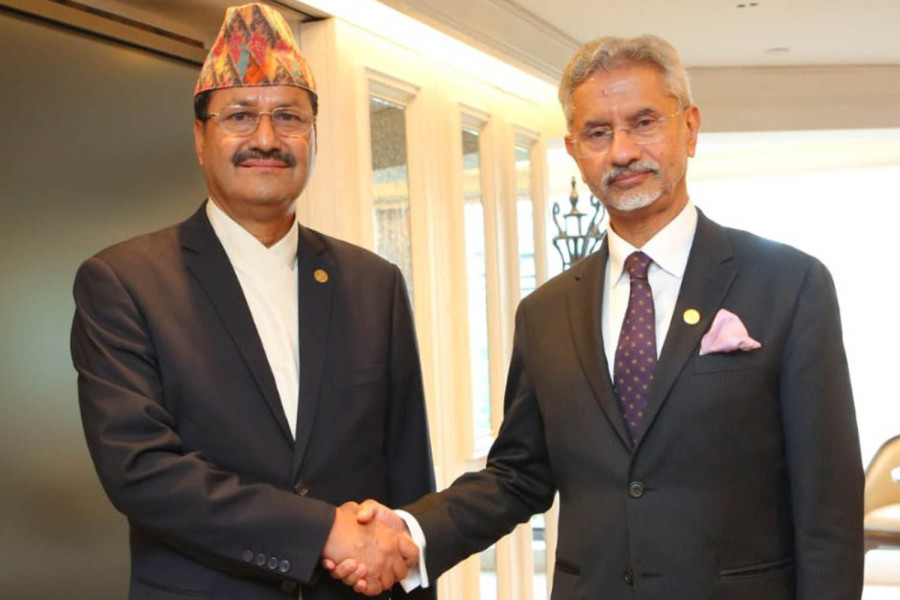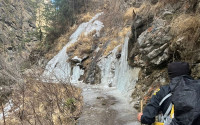National
Nepal, India plan ministerial-level joint commission meeting
The joint commission is the highest mechanism that reviews all aspects of bilateral ties and is empowered to take decisions as well as carve out a new blueprint.
Post Report
Nepal and India plan to convene the seventh meeting of the joint commission, the highest level bilateral mechanism between the two countries, to look after and address the entire gamut of the bilateral relations and to remove bottlenecks, if any.
However, the Nepali side has yet to decide on the date to convene the meeting, which will see participation of foreign ministers from both countries.
During the recent BIMSTEC Foreign Ministers’ Retreat held in Bangkok, Foreign Minister N P Saud invited his Indian counterpart, S. Jaishankar, to attend the meeting in Kathmandu for it’s Nepal’s turn to host the meeting, said an official who had accompanied Saud at the retreat.
The foreign minister-level joint commission is the highest mechanism that will review all aspects of bilateral ties between the two countries and is empowered to take decisions as well as carve out a new blueprint.
“The meeting will review the entire gamut of Nepal-India ties as well as take stock of the agreements and understandings reached between Nepal and India during the recent visit of Prime Minister Pushpa Kamal Dahal to India,” said the official.
Prime Minister Dahal was on an official visit to India from May 31 to June 2.
The last meeting of the joint commission had taken place in New Delhi on January 15, 2021 in the wake of the boundary dispute between Kathmandu and New Delhi after the then KP Oli government unveiled a new political map of Nepal incorporating the territories of Kalapani, Lipu Lekh and Limpiyadhura, which are currently occupied by India. During their last meeting, both sides had reviewed the entire spectrum of the bilateral relations that included supply of Covid-19 vaccine, boundary and border management, connectivity and economic cooperation, trade and transit, power and water resources, besides culture and education.
“The joint commission appreciated the close coordination between the two sides in facing the challenges posed by the Covid-19 pandemic. The Nepali side thanked the Government of India for its assistance in providing essential medicines and medical equipment. On Nepal’s request for the Government of India’s support in availing Covid-19 vaccines, the Indian side assured that the requirements of Nepal would be their priority after the roll-out of vaccines,” read the statement issued by the Ministry of Foreign Affairs after the meeting.
“The meeting discussed the boundary matter and expressed the commitment to an early completion of the boundary works in the remaining segments.” It also discussed the review of the Peace and Friendship Treaty of 1950, submission of the report of the Eminent Persons Group, and air entry routes.
According to Nepali officials, the next meeting of the joint commission will follow up on the understandings reached between the two sides during the official visit of Prime Minister Dahal, including cross-border infrastructure and connectivity, strengthening of development partnership and expeditious implementation of major ongoing projects and initiatives, establishment of earth station in Nepal with Indian assistance, construction of the integrated check posts, railway links, power transmission lines and upgrade of roads and motorable bridges.
The meeting will also take up matters like speeding up the implementation of the ongoing and planned bilateral projects such as the new Integrated Check Posts/Inland Container Depot, including at Dodhara-Chandani, remaining cross border railways, roads, and transmission lines, trade facilitation, inundation problems people living in the border areas face, especially due to non-tagging of embankments, interlinking of drains, and inadequate drainage provisions.
The meeting could be held in September or October, according to sources at the foreign ministry. “It is our turn to propose the date,” said one official.
Meanwhile, Saud has confirmed to the Post that he has invited his Indian counterpart to visit Nepal to take part in the joint commission meeting. “We had a discussion to convene the meeting at a convenient time,” he said. “We discussed holding the joint commission meeting during our recent meeting in Bangkok.”
The joint commission at the foreign minister level is the apex body to look into the bilateral relations and was formed during the Nepal visit of the then Indian Prime Minister Chandra Shekhar in February 1991. The meeting of the joint commission takes up entire bilateral issues between Nepal and India and convenes in an alternative country on an agreed date.




 9.56°C Kathmandu
9.56°C Kathmandu













